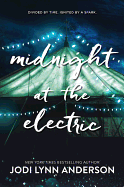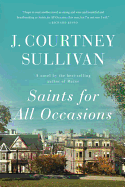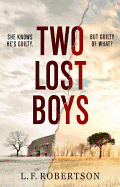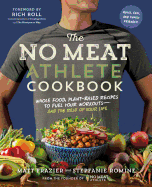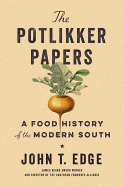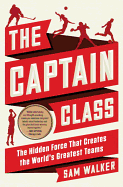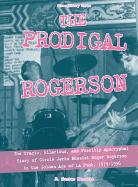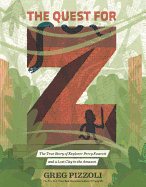Week of Tuesday, June 13, 2017
Musician and journalist Max Décharné's Vulgar Tongues: An Alternative History of English Slang, out now from Pegasus Books, is a rip-roaring ride through the history of slang. From Elizabethan London to the present day, this entertaining take will not disappoint. Here's Décharné's write-up on the word "groovy"--which, interestingly enough, has very little to do with Austin Powers and his ilk.
 |
|
| photo: Katja Klier | |
Many people probably assume that the word "groovy" is a classic piece of 1960s slang. In fact, it actually began life as the hip new jazz word of the early 1940s, batted around carelessly by bebop musicians and pulp novelists.
Crime writer Chester Himes used the word in his first book, If He Hollers, Let Him Go (1945), while in jazz clarinettist Mezz Mezzrow's landmark memoir, Really the Blues (1946)--which contained a wealth of musicians' phrases like "cafe sunburn" (the habitual pallor acquired in such a nocturnal environment) and "hipster" (defined as "someone who's in the know, grasps everything, is alert")--the word "groovy" was defined as "really good, in the groove, enjoyable." A phonograph needle playing the music correctly was in the groove, and so was a band that was swinging. Bing Crosby memorably asked the King Cole Trio during his regular Kraft Music Hall radio show in those days: "Say, is it a solid fact that you guys can beat your chops, lace the boots and knock the licks out groovy as a movie, whilst jiving in a comin'-on fashion?" Nat Cole suavely replied, "That is precisely the situation." Jazz music spread jazz slang across the globe, which was then adopted by the Beats, co-opted by 1950s rock 'n' rollers (Johnnie Shelton & His Rockabillies had a 1958 song praising a hangout named "Groovy Joe's") and finally enshrined in popular culture in the 1960s with the spread of jazz-derived hippie language. Everything was indeed groovy.
Jazz music spread jazz slang across the globe, which was then adopted by the Beats, co-opted by 1950s rock 'n' rollers (Johnnie Shelton & His Rockabillies had a 1958 song praising a hangout named "Groovy Joe's") and finally enshrined in popular culture in the 1960s with the spread of jazz-derived hippie language. Everything was indeed groovy.
Few people, however, knew of the completely opposite slang meaning of the word in late Victorian England, where it applied to someone stuck in a groove, or a rut--in short a square--as defined in Farmer and Henley's Slang and Its Analogues (1890): "GROOVY, Adj. – Settled in habit; limited in mind."
Saints for All Occasions
by J. Courtney Sullivan
J. Courtney Sullivan (The Engagements) traces the story of the Flynn-Rafferty clan in her fourth novel, Saints for All Occasions. Growing up on her family's farm in County Clare, Ireland, Nora Flynn could see her whole life unfolding ahead of her. She'd marry Charlie Rafferty, the first boy she ever kissed, and they'd raise their children in the village where they know every face and every stone. But plans take a turn when Nora sails to the United States with her younger sister, Theresa, to join Charlie in Boston. Adventurous Theresa dreams of a teaching career and high romance, while shy, sensible Nora wants to earn some money and go back home. But when Theresa becomes pregnant, both sisters make a choice with far-reaching consequences for their family.
Sullivan begins her narrative in 2009, with the death of Nora's eldest son, Patrick: the winsome boy who caused her more worry than her other three children put together. A phone call to Theresa, now a cloistered nun in Vermont, hints at the fraught history between the sisters, and Sullivan untangles the skein of the past 50 years with nimble strokes. Nora's other children each get their due, both as part of her family and as their own, fully realized selves. Boston's tightly knit, boisterous Irish and Irish-American communities are rendered in vibrant detail, and Theresa's winding path to (and within) the monastery is an unexpected delight. Saints for All Occasions is a keenly observed story of family, regret and love--especially the complex, unbreakable bond sisters share. --Katie Noah Gibson, blogger at Cakes, Tea and Dreams
Discover: J. Courtney Sullivan's fourth novel is a smart family saga set in Boston's Irish American community.
Chemistry
by Weike Wang
Weike Wang's beguiling first novel, Chemistry, opens with a marriage proposal from the narrator's attentive boyfriend, Eric: "Ask me again tomorrow, she says, and he says, that's not how this works." They met in a prestigious chemistry Ph.D. program in Boston. Eric is focused and insightful, leading his lab team to success; the narrator's best efforts fail and fail again. The only child of driven, judgmental Chinese immigrants who settled in Detroit with nothing, she isn't allowed to fail. Frustrated to the point of anguish, she smashes her lab beakers and exits the program. So begins the funny, idiosyncratic story of a young woman with big brains, big family baggage and a wonderfully fresh voice sorting out a world of science, language, dogs, counseling therapy, a BFF and her baby, SAT tutoring, Boston weather, cases of wine, TV cooking shows--and piecing together the right chemistry in her life.
With an undergraduate chemistry degree and a public health Ph.D. underway, Wang has no lack of over-bleached lab coats in her closet. Her narrator spices her daily ups and downs with a little bit of science here, a Chinese language oddity there, shrink-talk and a running stream of observations about parents and child- and dog-rearing. "We've mapped the entire human genome but don't know what most of it says."
Wang has an astute feel for the deep, scary uncertainties of a young, talented woman trying to shake off a demanding family and a derailed career and relationship. Chemistry is full of surprises--its many digressions congealing to yield an impressive literary blend. --Bruce Jacobs, founding partner, Watermark Books & Cafe, Wichita, Kan.
Discover: With wry observation and witty distraction, the narrator of Weike Wang's first novel is a Chinese immigrant daughter and a scientist trying to sort things out.
Mystery & Thriller
Two Lost Boys
by L.F. Robertson
Death Row lawyer L.F. Robertson makes her debut with a powerful story of secrets, fidelity and a fatally flawed judicial system. Robertson's protagonist, Janet Moodie, is an appeals lawyer. Following her husband's suicide, Janet swore off the high-stakes capital cases to maintain her sanity, but a death row appeals attorney approaches her for help when she "was feeling disenchanted with what I was doing instead."
Andy Hardy and his brother Emory were convicted of kidnapping three prostitutes and killing two of them. Andy was sentenced to death while Emory received life in prison. Right away Janet identifies weaknesses in Andy's case. She has no doubt Andy was complicit in these heinous crimes, but his original attorney seemed to make no effort to save him from being condemned to die. What starts out as typical appellate work with a lot of boilerplate reports Janet can complete on auto-pilot turns into an intense investigation that unearths dark secrets some people would rather never saw the light of day.
Two Lost Boys is a bold mystery, and a critical examination of capital punishment and the justice system. Robertson's insider knowledge of this emotionally taxing subset of the legal system enables her to communicate the complicated processes without bogging down readers with excessive jargon or slowing down her plot with unnecessary detail. And through Janet's competence and compassion, Robertson authentically depicts the humanity of the condemned without discounting or ridiculing legitimate concerns of citizens. Two Lost Boys is an all-around stellar debut. --Jen Forbus, freelancer
Discover: A death row lawyer struggles to find evidence that will save her condemned client's life, but that information is buried alongside dark secrets that others will fight to keep hidden.
Romance
The Wedding Date Bargain
by Mira Lyn Kelly
Twenty-eight-year-old Sarah Cole, dedicated career woman, is spending a two-month interlude in Chicago before heading to her dream job in New York City. When her temporary boss, Sean, needs a date to a wedding, she agrees to go. There she encounters the best man, Max Brandt--sexy cop, infamous ladies' man and the guy she had a huge crush on in college.
This gives Sarah an idea; she has a pesky little problem that she wants taken care of before she moves to New York. That problem is her virginity, and Sarah is sure that Max is the person to help her out. So together they make a plan: four dates in Chicago, no commitment, no contact after that. But can they stick to their deal? Or will love end up interfering?
Mira Lyn Kelly (May the Best Man Win) has written a funny, steamy romance, sure to captivate readers. Sarah's predicament leads to some hilarious and awkward moments as she tries to pretend she's more experienced than she is, and Max's cocky exterior conceals an inner kindness and irresistible sexiness that are revealed slowly. A host of side characters--Max and Sean's friends--add interest to the main love story. The Wedding Date Bargain may have a slightly clunky title, but it is a charming and funny story that romance readers and fans of the Windy City are sure to love. --Jessica Howard, blogger at Quirky Bookworm
Discover: Sarah is determined to lose her virginity, and she thinks Max, a sexy cop, is the guy to help her.
Food & Wine
The No Meat Athlete Cookbook: Whole Food, Plant-Based Recipes to Fuel Your Workouts--and the Rest of Your Life
by Matt Frazier and Stepfanie Romine
Vegan ultramarathoner Matt Frazier (No Meat Athlete and founder of the popular website of the same name) teams up with health coach Stepfanie Romine to shatter the misconception that athletes require animal products in their diets. Together they've created The No Meat Athlete Cookbook, with 125 plant-based recipes providing a powerhouse of essential nutrients for strength and endurance.
"It's everything in the food--and the remarkably complex interactions of countless nutrients--that our bodies thrive on, not a single constituent," the authors state. Because the body also requires less time to process whole foods, more energy is available for workouts and a full recovery afterward.
In The No Meat Athlete Cookbook, Frazier and Romine advocate a gradual transition to a plant-based diet, emphasize cooking without oil and offer suggestions for numerous plant sources of protein. Nutritional supplements and protein powders are discussed, along with tips for stocking a plant-based kitchen and food preparation techniques.
Easy-to-follow recipes for every meal (including dessert!) feature simplified, meatless versions of comfort foods such as burgers and stews. People avoiding gluten, oil or soy will find plenty of options, with recipes labeled accordingly and further categorized as fast food (ready in less than 30 minutes), slow food (requiring an hour or more of prep or rest time) and suitable for pre-athletic event carbo-loading. Several dishes are presented as blueprints designed for culinary improvisation, and the authors' concept of "A Grain, A Green, A Bean, A Spice Blend" offers flexibility and versatility for quick meals.
Although athletes are this cookbook's focus, Frazier and Romine's approach is a winner for anyone seeking a healthier way of life. --Melissa Firman, writer, editor and blogger at melissafirman.com
Discover: Easy plant-based recipes offer athletes of all levels a versatile approach to eating that promotes complete nutrition, strength and endurance.
Social Science
The Potlikker Papers: A Food History of the Modern South
by John T. Edge
Pot liquor, or potlikker, is the seasoned liquid left behind from boiling greens; it was historically a salvage food consumed by the poor. Like a lot of roadside shack cuisine (fried chicken, barbecue) turned white tablecloth fare, potlikker has undergone its own gentrification in recent years, emerging as an elegant finishing sauce for grilled fish or a broth used to poach trout and flavor noodles. Foodways Alliance director and food historian John T. Edge (Southern Belly) examines how salvage and roadside food have redefined American cuisine and the cultural history of the South.
Edge begins with profiles of Georgie Gilmore (a cook whose sale of sandwiches helped fund the Montgomery bus boycotts of the 1950s) and Fannie Lou Hamer (a farmer who advocated for black property rights). These two women helped facilitate the rise of black power in the 1960s. In the 1970s, black migration to urban areas for employment prompted savvy entrepreneurs like Harland Sanders to turn the tastes of home, like fried chicken, into a fast-food "entrepreneurial grail." As Jimmy Carter's presidential campaign popularized grits and the ideals of the New South, cooks like Edna Lewis "challenged chefs to learn 'from those who worked hard, loved the land, and relished the fruits of their labors.' "
The Potlikker Papers is a loving homage to Edge's Southern roots, as well as a work of "remembering through food, an act of recollection that gathers sometimes lost narratives to tell old stories in new ways." --Nancy Powell, freelance writer and technical consultant
Discover: John T. Edge shows how Southern food has altered American cuisine through personal anecdotes and profiles of key historical and social activists.
Nature & Environment
Arts of Living on a Damaged Planet: Ghosts and Monsters of the Anthropocene
by Anna Tsing, Heather Swanson, Elaine Gan, and Nils Bubandt
Calling a book "mandatory reading" usually feels hyperbolic, but it's justified in the case of Arts of Living on a Damaged Planet, a collection of essays about humanity, the natural world and what's next for us all. Written by academics, intellectuals and luminaries of literature, the pieces explore natural and man-made disasters, the deep reverberations of nuclear power, and how the human body should not be considered a single organism, but an ecosystem.
If that list of subjects sounds heavy, it is. Arts of Living on a Damaged Planet gets as deep as it can go, from questions surrounding the time/space continuum to how human activity is killing species at a catastrophic rate. But the point is not to shame or depress the reader. Editors Anna Tsing, Heather Swanson, Elaine Gan and Nils Bubandt (academics who originally brought the essayists together for a series of conferences) want to spur action. They hope that by reorienting how the reader considers herself--down to the very strands of her DNA--she may be willing to help change the fate of the planet. It's a lot of ask of one book, which is why it's quite stunning that Arts of Living on a Damaged Planet delivers so admirably.
Readers will explore the guts of the Chernobyl reactor, interact with an Indonesian mud volcano whose origins are still not fully explained, and watch ants of the American Southwest form new colonies. Arts of Living on a Damaged Planet is a trip, but one with a noble aim: changing how we all think about the world. --Noah Cruickshank, adult engagement manager, the Field Museum, Chicago, Ill.
Discover: A stunning collection of essays from scientists, writers and artists on humankind's impact on the planet, and how we all can survive it.
Sports
The Captain Class: The Hidden Force That Creates the World's Greatest Teams
by Sam Walker
What makes a great team? What factors allow a team to dominate its sport? And how can a team (or business) hope to sustain this level of success? These questions propel Sam Walker's The Captain Class: The Hidden Force That Creates the World's Greatest Teams, a fascinating and thought-provoking examination of the dynamics of teamwork and winning.
Walker, the Wall Street Journal's founding sports section editor, has compiled a list of the 16 most dominant teams in world sports--including the 1960s Boston Celtics, the 1970s Pittsburgh Steelers and the Australian women's field hockey team of the 1990s. It is an eclectic list, and, according to Walker, what links these teams is the presence of a specific type of captain--a leader who doesn't possess otherworldly natural ability, but rather one who leads by example. Think Bill Russell, not Michael Jordan; more Yogi Berra than Mickey Mantle. Walker claims a great team leader knows how to motivate without intimidating and, according to Duke University basketball coach Mike Kryzewski, "[sets] higher standards than the team would normally set for itself."
The Captain Class also contains fascinating (or cringe-worthy) behind-the-scenes anecdotes, like the New Zealand rugby captain who played with a torn scrotum and Yogi Berra relaxing a wound-up Whitey Ford by telling him, "Okay, Slick. The main feature at the movies starts at six. It's four now, and I want to be on time."
Walker strikes the right balance between analytics and anecdotal evidence to support his theory on team leadership; The Captain Class never feels cumbersome. Instead, Walker draws the reader into his passionate investigation of the inner workings of great sport teams. --David Martin, freelance writer
Discover: A compelling look at what makes a great team, The Captain Class will appeal to sports fans, businesspeople and anyone curious about group dynamics.
Performing Arts
The Prodigal Rogerson: The Tragic, Hilarious, and Possibly Apocryphal Story of Circle Jerks Bassist Roger Rogerson in the Golden Age of LA Punk, 1979-1996
by J. Hunter Bennett
In The Prodigal Rogerson, J. Hunter Bennett pieces together the turbulent life and career of Circle Jerks bassist Roger Rogerson through interviews with former bandmates, wives and friends.
Rogerson was an original member of the successful Southern California hardcore band from the bedrock of Los Angeles punk in the 1970s and '80s, alongside Black Flag, Agent Orange and TSOL. But his drug use and behavior plagued the group. A classic example: he would often trash his bass at the end of a set. Drummer Lucky Lehrer laments, "We'd make like $1,000, but we'd have to buy him a new bass." Following a heroin overdose and deteriorating playing ability, Rogerson was kicked out of the band. He promptly stole their van and disappeared--for 13 years.
The Prodigal Rogerson pieces together what happened leading up to his disappearance and following his brief return, hoping to reunite the band but instead dropping dead. The chronology jumps around, and bandmates' memories often clash. One section is even called "1976 or '77. Or '78. Or maybe even 1979." But despite Rogerson's substance abuse, the mosaic composed in The Prodigal Rogerson exhibits fragments of a man who was as cared for as he was imperfect. An undercurrent of love runs throughout. Photos in the book lend life and authenticity, a window into Rogerson's antics as well as his attitude: a scowl, a smirk and sometimes even a smile. --Katie Weed, freelance writer and reviewer
Discover: A music writer explores the tumultuous career and untimely death of a member of the iconic SoCal hardcore punk band Circle Jerks.
Children's & Young Adult
Midnight at the Electric
by Jodi Lynn Anderson
The year is 2065. Sixteen-year-old orphan Adri Ortiz has sacrificed everything for a chance to be one of the lucky few living on Mars, "starting the world over... but with more brains." As a colonist-in-training, she moves to Kansas for her final three months on Earth, into the home of Lily, an elderly cousin she never knew existed. While unpacking at Lily's, Adri discovers a mysterious postcard and, on further investigation, finds a journal and bundle of letters written long ago. They become "the moment she first touched her own history."
Catherine's journal describes how she's been in love with Ellis, their farmhand, forever, but fears the dust storms of 1934 will kill her younger sister, Beezie, coating her lungs until she can't breathe anymore. She understands that it will take courage to save themselves, but Ellis and Mama refuse to leave the farm. When Catherine discovers a postcard and letters sent from England in 1919 by a girl named Lenore, she finds the will to act. Lenore is driven to escape the "suffocating gloom" of her brother Teddy's death in World War I, though she seems unable to come to terms with the grief. Lenore means to sail to America, join her best friend Beth, and make a new life.
In Midnight at the Electric, Jodi Lynn Anderson (My Diary from the Edge of the World; The Vanishing Season) weaves a shining tale of hope in the face of adversity. Her strong, independent women are linked through time by family ties, friendship and the gift of a tortoise named Galapagos. Even while facing "terrible uncertainties," they continue to seek a better life for themselves, their loved ones and, ultimately, the entire human race. --Lynn Becker, blogger and host of Book Talk, a monthly online discussion of children's books for SCBWI
Discover: Sixteen-year-old Adri, preparing to colonize Mars in 2065, finds her life is surprisingly interconnected with two women from long ago when old letters come to light.
The Quest for Z: The True Story of Explorer Percy Fawcett and a Lost City in the Amazon
by Greg Pizzoli
Facing vampire bats, anacondas, assassin bugs and locals with poison-tipped arrows, Percy Fawcett mapped and explored the Amazon rain forest in the early 1900s. After his initial years in South America surveying borders and scouting wildlife for the Royal Geographical Society (RGS), Fawcett became convinced of the existence of a great mythical city he called Z. "He pictured a paradise of grand temples and palaces carved from stone, hidden from modern man deep within the jungle."
Unfortunately, RGS would not fund his search for Z, meaning Fawcett had to get creative: he returned to the rain forest in 1925 with only his son Jack and Jack's childhood friend Raleigh Rimell, plus two local men acting as guides, and two dogs, four horses and eight donkeys. Fawcett sent reports of their progress back to England and after one final dramatic letter home--"I expect to be in touch with the old civilization within a month and to be at the main objective in August"--he and his crew disappeared.
In this fascinating and unusual picture book, Greg Pizzoli (Tricky Vic: The Impossibly True Story of the Man Who Sold the Eiffel Tower; Number One Sam; The Watermelon Seed) tells the true story of Percy Fawcett, a man who "thrived in the jungle." With his matte, mixed-media artwork, Pizzoli makes Fawcett's fantastic story especially accessible to younger readers who will likely be comforted by the funny, simple illustrations of people and wildlife.
Adventurers of the armchair and serpent-slaying variety alike will clamor to travel with Pizzoli on Fawcett's magical and deadly Quest for Z. --Emilie Coulter, freelance writer and editor
Discover: In this thrilling picture book biography, a remarkable lifelong quest takes an explorer into the Amazon jungle in search of an ancient lost city.



